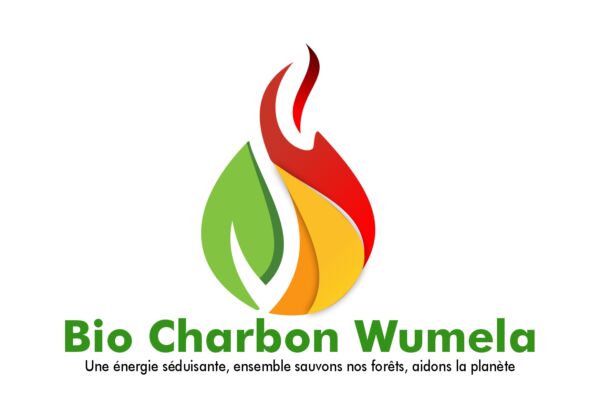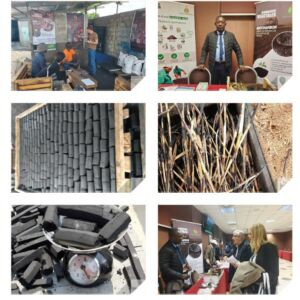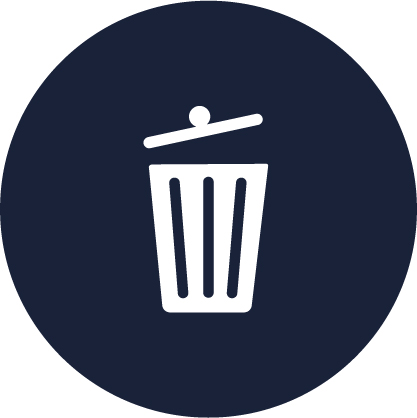
BIOCHARBON WUMELA
Biocharbon Wumela is a citizens' cooperative whose main activity is the processing of all plant biomass waste collected in the neighbourhoods and surrounding villages.

Overview of the project

Biocharbon Wumela is an organisation based in the Republic of Congo, more specifically in the city of Pointe Noire, in the Agricongo industrial zone, in the Mayinga Ngoyo district. Spread over 2 operating sites, its tricycles are used to collect household and agricultural waste, including biodegradable waste used to make charcoal briquettes or green charcoal. While the manufacture of charcoal has a devastating impact on the forests of the Congo Basin, here the charcoal briquettes are environmentally friendly because they are made from biodegradable waste. This innovative initiative was set up a few years ago to combat insalubrity, climate change and youth unemployment, as some twenty green jobs are currently being created. We start by collecting waste from various households and markets, then sorting it. We then carbonise it and grind it to obtain a homogeneous mixture with the binder we mix it with. Then we press the mixture in our briquette presses before drying, packaging and marketing. This alternative to cutting down trees helps to protect the environment and biodiversity by limiting deforestation, and is also a source of employment. With this environmentally-friendly charcoal, households benefit from clean, low-cost fuel. That’s what motivated this mother of a family
Overall project objective: Limit deforestation, ecosystem degradation and greenhouse gas emissions. Specific objectives 1. To convert biomass waste from households and farmers into biochar. 2. Combat insalubrity 3. Substitute energy sources from fossil fuels Main expected results Creation of green jobs Reduction of waste in the city Reduction in the use of wood as a household energy source People no longer have to travel long distances to cut wood. Reduction in eye diseases such as cataracts Adoption of charcoal as a new source of energy by local people. Good waste management by households
Ongoing research
22/11/2018
Every year, over 200 tonnes of waste are collected, sorted and processed. This collection of organic waste helps to clean up cities; more than 50 tonnes of biochar are produced every year; 300 tonnes of wood are preserved and saved thanks to the recovery of 200 tonnes of waste per year; more than 100 people, students and associations, have been made aware of the risks linked to climate change and the wealth around waste thanks to the circular economy; more than 100 households have benefited from biochar samples to carry out tests; emissions of 300. 000 tonnes of CO2 are avoided thanks to the 300 tonnes of wood preserved; creation of an income chain through the collection of waste and the sale of biochar (agricultural and heating).
Reducing greenhouse gas emissions and moderating the effects of global warming; creating carbon sinks and reserves by giving a second life to organic waste; building the capacity of groups and students by raising awareness and providing environmental education; promoting sustainable socio-economic and cultural development by reducing final waste; improving the system for collecting, managing and processing plant waste; stimulating the biological activity of soils and improving nutrient and water retention thanks to agricultural biochar; improving the pH of acid soils and increasing organic matter in the soil; reducing the consumption of chemical fertilisers.
The project was financed from its own funds.
organisation

Biocharbon Wumela is a citizens’ cooperative set up in 2018 by a polytechnician in electrical engineering. Its main activity is the processing of all plant biomass waste collected in the neighbourhoods and surrounding villages. The cooperative has set up a value and revenue chain, managed by a team of 12 people; when necessary, the cooperative uses the labour force of the localities in which the waste is collected and transformed to produce a clean energy called Wumela Biocharbon. The production site is Pointe Noire. The cooperative is fighting three dangerous challenges that threaten humanity: climate change, lack of energy and poverty. It offers the population an energy alternative.
in collaboration
PNUD CONGO ; INITIATIVES CLIMAT ; CAGEDEA ; FONDATION EBOKO ; FEMME ENERGIE ; PADRO ; KEMIT ECOLOGY ; RSE PED ; FECOPAM.


